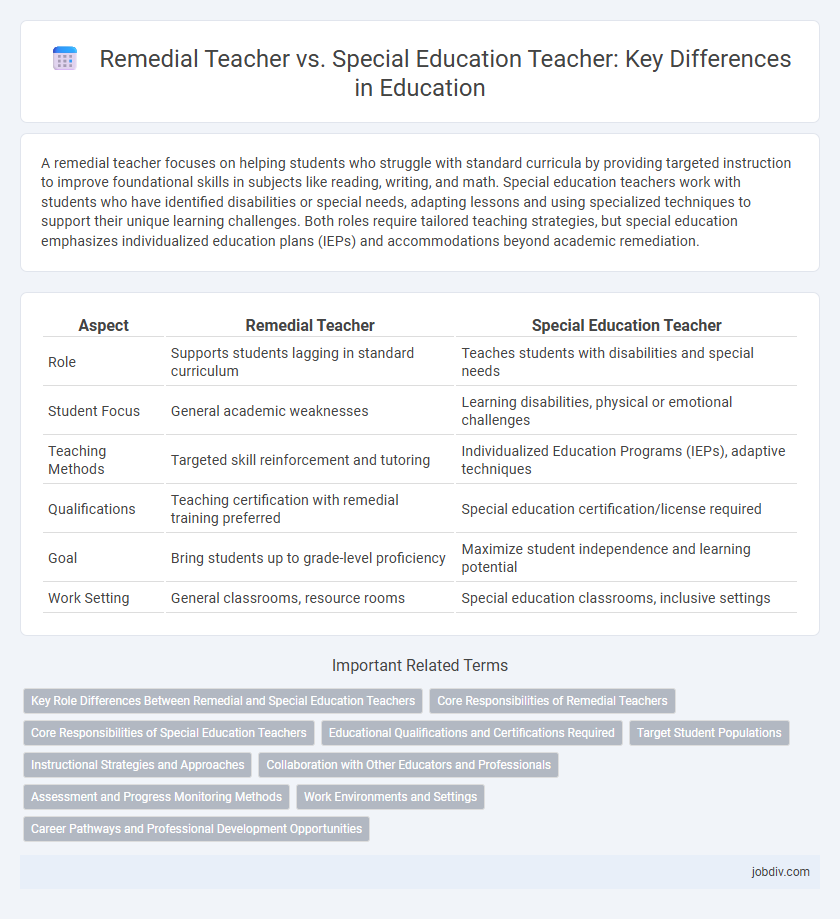A remedial teacher focuses on helping students who struggle with standard curricula by providing targeted instruction to improve foundational skills in subjects like reading, writing, and math. Special education teachers work with students who have identified disabilities or special needs, adapting lessons and using specialized techniques to support their unique learning challenges. Both roles require tailored teaching strategies, but special education emphasizes individualized education plans (IEPs) and accommodations beyond academic remediation.
Table of Comparison
| Aspect | Remedial Teacher | Special Education Teacher |
|---|---|---|
| Role | Supports students lagging in standard curriculum | Teaches students with disabilities and special needs |
| Student Focus | General academic weaknesses | Learning disabilities, physical or emotional challenges |
| Teaching Methods | Targeted skill reinforcement and tutoring | Individualized Education Programs (IEPs), adaptive techniques |
| Qualifications | Teaching certification with remedial training preferred | Special education certification/license required |
| Goal | Bring students up to grade-level proficiency | Maximize student independence and learning potential |
| Work Setting | General classrooms, resource rooms | Special education classrooms, inclusive settings |
Key Role Differences Between Remedial and Special Education Teachers
Remedial teachers focus on enhancing foundational skills such as reading, writing, and math for students struggling to meet grade-level expectations, employing targeted interventions to close learning gaps. Special education teachers specialize in instructing students with disabilities, designing individualized education plans (IEPs) that accommodate diverse needs across cognitive, emotional, and physical domains. While remedial instruction targets academic deficiencies, special education encompasses broader support including behavioral, social, and adaptive strategies tailored to each student's unique challenges.
Core Responsibilities of Remedial Teachers
Remedial teachers specialize in identifying and addressing learning gaps by implementing targeted instructional strategies to help students improve basic skills in reading, writing, and mathematics. They assess individual student performance through diagnostic tests and tailor lessons to meet specific academic needs. Their core responsibilities include monitoring progress, adapting teaching methods, and collaborating with regular classroom teachers to support student success.
Core Responsibilities of Special Education Teachers
Special education teachers design individualized education programs (IEPs) tailored to the unique needs of students with disabilities, ensuring access to the general curriculum through adapted teaching methods and materials. They collaborate with parents, therapists, and other educators to monitor progress and adjust interventions, promoting social, emotional, and academic development. Their core responsibilities include assessing student abilities, implementing behavior management strategies, and providing specialized instruction in compliance with legal requirements like the Individuals with Disabilities Education Act (IDEA).
Educational Qualifications and Certifications Required
Remedial teachers typically hold a bachelor's degree in education or a related field, along with state certification to teach general or specific subjects, and may pursue additional credentials in remedial instruction or literacy intervention. Special education teachers are required to have a bachelor's degree in special education or a related specialty, often followed by obtaining state certification specific to special education, which includes training in individualized education programs (IEPs) and specialized instructional strategies. Both roles often require continuing education and endorsements to address evolving educational standards and student needs effectively.
Target Student Populations
Remedial teachers primarily support students struggling to meet standard academic benchmarks, often focusing on literacy, math, or language skills gaps. Special education teachers work with students who have identified disabilities, addressing individualized learning plans that accommodate cognitive, emotional, or physical challenges. Both roles require specialized strategies, but the target populations differ based on skill deficits versus diagnosed disabilities.
Instructional Strategies and Approaches
Remedial teachers employ targeted instructional strategies such as scaffolding, repetition, and differentiated practice to help students overcome specific learning gaps and reinforce foundational skills. Special education teachers utilize individualized education plans (IEPs) and employ specialized approaches like multisensory instruction, assistive technology, and behavior management techniques tailored to diverse disabilities. Both roles prioritize personalized learning but differ in the scope and intensity of instructional modifications based on student needs.
Collaboration with Other Educators and Professionals
Remedial teachers collaborate closely with general education teachers to develop targeted intervention strategies for students struggling academically, ensuring consistent support across subjects. Special education teachers work alongside therapists, psychologists, and medical professionals to create comprehensive individualized education programs (IEPs) tailored to students with disabilities. Both roles require effective communication and teamwork to address diverse learning needs and promote student success.
Assessment and Progress Monitoring Methods
Remedial teachers primarily use formative assessments and frequent progress monitoring tools like quizzes and diagnostic tests to identify learning gaps and tailor instruction for struggling students. Special education teachers implement individualized education program (IEP)-based assessments alongside adaptive behavior scales and criterion-referenced tests to evaluate student progress in meeting specific learning goals. Both roles utilize data-driven decision making, but special education assessments emphasize functional skills and accommodations more extensively.
Work Environments and Settings
Remedial teachers typically work in general education settings such as public schools, tutoring centers, or after-school programs, focusing on helping students who need extra support in core subjects like reading and math. Special education teachers are found in specialized classrooms, resource rooms, or inclusive school environments, providing tailored instruction for students with disabilities or special needs. Both roles may also involve collaboration with parents, counselors, and other educators to create effective learning plans and support systems.
Career Pathways and Professional Development Opportunities
Remedial teachers primarily focus on helping students overcome academic challenges, often specializing in literacy and numeracy interventions, while special education teachers work with students with diverse disabilities, requiring advanced training in individualized education plans (IEPs) and behavioral management. Career pathways for remedial teachers typically begin with certifications in general education and targeted remedial strategies, progressing through roles such as literacy coach or curriculum specialist, whereas special education teachers often advance through specialized certifications or master's degrees, leading to positions like special education coordinator or advocate. Professional development opportunities for remedial teachers emphasize evidence-based instructional techniques and assessment tools, contrasting with the specialized training in assistive technology, legal compliance, and inclusive classroom strategies available to special education teachers.
Remedial Teacher vs Special Education Teacher Infographic

 jobdiv.com
jobdiv.com